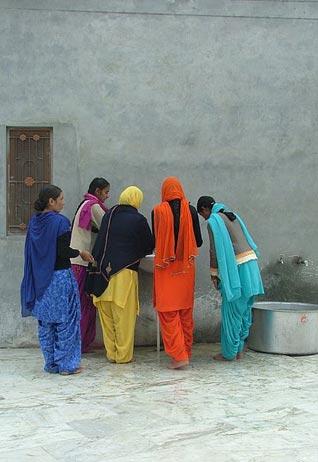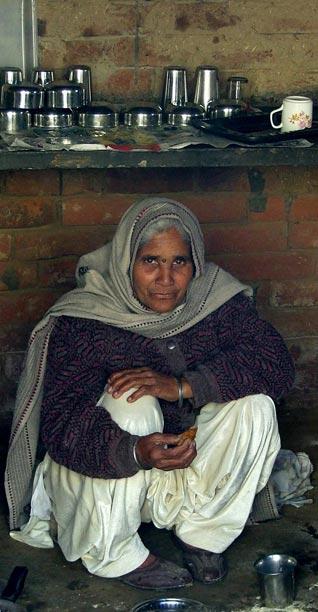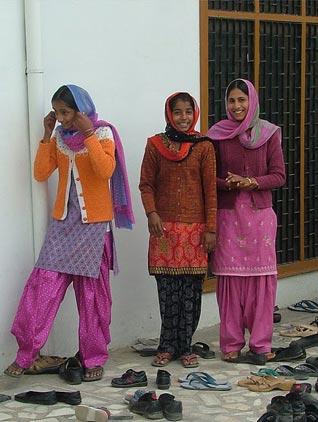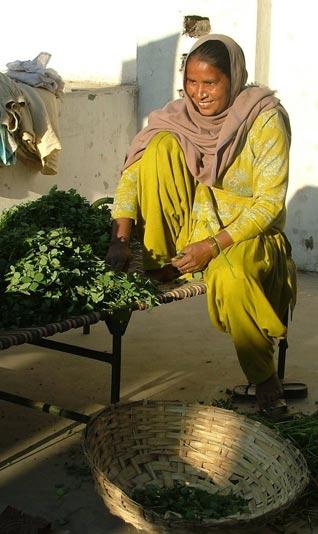People
My Mothers Story:
The Girls Ate Last
(Part One)
by SUPRIYA SINGH
PART ONE
For a long time it was a secret that my uncles Swaran and Khojinder were actually my mother's step-brothers.
Of Baiji, her stepmother, I knew nearly nothing. She died before I was born. I had never seen her photograph. I did not know her name. That in itself does not say much. I did not know that my mother's mother who died of tuberculosis in 1911 when Mummy was nine months old was called Sant Kaur or that Mummy's father's name was Ganga Singh till I began writing the story. I never heard my mother tell the name of her grandmother, Naniji. But as it turned out, Baiji's name was also Sant Kaur.
It was a strange coincidence that Mummy's father had married three women, all of whom were called Sant Kaur.
Talking of the first two years in her father's house with her stepmother, Mummy lowers her voice. They were hard years, she says. Baiji would serve Bauji (Mummy's father) in the largest plate, then Khojinder, her brother who was born when she was six.
"Baiji herself would have little," Mummy says, "but mine was always the smallest. I knew which portion was mine, because she gave me the least."
The contrast with her grandfather's house was stark. For the first nine years of her life, my mother lived in her maternal grandfather's three storeyed house in Rawalpindi. Whenever Mummy spoke of her childhood with her grandfather, she glowed. She knew she was the centre of his life. He would bring sweet delicacies to give to my mother to distribute to the other children. He would wake her up early in the morning to spoon almonds and cream into her mouth, then let her go back to sleep.
When her mother's two brothers got married, Mummy told Nanaji (her grandfather) the girls in her school had complained they had not received sweetmeats. The next day at noon the family servants brought baskets of sweets to the school.
"Happiness permeated through me," my mother says "I was so important that something I said to him yesterday, he had fulfilled today."
At the marriages of her uncles, Nanaji had two gold bangles of five tolas (50g) each made for every granddaughter. Mummy was six or seven years old and somebody took them off her when she was asleep. Many days passed. Then Nanaji fell ill. When
the carriage came to take the children to see him, Nanaji noticed that Mummy's arms were bare. He called my mother's father's younger brother and told him to take her to the family jeweller to have bangles made.
"And day after tomorrow bring her wearing the bangles," he said. When she came back with the bangles, he held her hand tightly and kissed the bangles and said, "How can my daughter not have bangles?"
The last time Mummy saw Nanaji, he was ill. She says, "He called me. He called me and held my hand. Even now I remember his words, ‘I used to say, I'd get her married while she was young. I wanted to see her hands with choorra (the ritual red bangles worn by a new bride)'."
She was taken to her father's house. At about 10 P.M. they got a message that her grandfather had died. Even at 75, her voice chokes. After her grandfather's death, she says "My life became a bit difficult. Bauji had full domain over me." He ensured that her coming and going to her grandfather's house decreased.
"He was wise," she says. "There were young boys in the house. And there used to be a lot of servants. I was nine years old."
But with her grandfather's death, she says, "I fell into the hands of this mother."
My mother laughs painfully. Baiji herself would have no breakfast. She would drink tea and give tea to Mummy too. No milk and no breakfast. Later, when Mummy visited Baiji's village, she found it was the general practice that girls ate after the boys and ate less. Mummy says, "Even if she had had her own daughter, she would have given her less. But I used to think she gives me less because she is my stepmother."
On summer mornings Baiji would give Mummy nothing to eat. Every third morning she would give Mummy a drink of milk diluted with water. Winters were different, for Bauji went to work at 9 am and Mummy and Khojinder also went to school at the same time.
A favourite meal was to have roti, that is, bread cooked on a griddle, with cauliflower in the morning. Baiji would put ghee inside to get the roti a bit crisp, then crumple it till the air came out. It was so delicious that after Baiji's death, Swaran used to ask Mummy to make him a roti with cauliflower like Baiji used to make.
But summers when Mummy left for school at 7 am, those were the mornings without food.
"I used to get four paise as a scholarship every morning," Mummy said. This was a time when four paise made an anna and 16 annas made a rupee.
"Baiji would give me two paise out of it, and with that I could get a puri ((deep fried unleavened bread) during the break, at 9 or 10. I began to steal the money she kept under a cloth. I would eat two puris then. She found out, and I told her 'Yes, I have taken the money.' She got angry. But she could not string me up, could she?"
Bauji knew that Baiji did not give his daughter breakfast. He would get angry with Baiji and tell her to give the girl a glass of milk to drink. There would be a fight, but Mummy says that for all that anger and fighting, Bauji too did not ensure that she was well fed.
When almonds came from Kashmir, Khojinder had pockets full of them, as he used to stammer. Afterwards, she would bully Khojinder and get some almonds off him. If corn came from the land, the biggest corn cob went to Khojinder. Mummy says she
remembers when she was ten, she raised a ruckus that she wanted the bigger corn cob. Bauji got angry with Baiji and they started fighting.
Mummy says, "When they started fighting I forgot the corn."
Mummy tried not to show her resentment or complain about her mother, for it would lead to fights. But that meant she was never good at directly asking for what she wanted. She became weak and began to have bouts of fever. Bauji began to fear his daughter would get TB like her mother. But then, a Muslim tenant on their land in Dera Khalsa, who could not pay his rent, gave them his buffalo. That was the saving of her.
"I could then drink as much buttermilk as I liked. Baiji would not stop me. Even in the coldest months, in December and January, I would drink three to four glasses of buttermilk."
My mother was 11 before she understood why Baiji was so harsh with her. As the new wife of a widower, she felt she had a right to the previous wife's jewellery. However, this jewellery was with Mummy's grandmother, Naniji, who was keeping it safe for her.
Wanting the jewellery, Baiji would curse Mummy's mother. She kept saying her rights had been trampled upon, that because of this stepdaughter, she did not have the jewellery. When Mummy understood, she persuaded Naniji to hand over the jewellery. Naniji remonstrated that the jewellery was her mother's and so should be hers. But Mummy convinced them that her life in her father's house was not worth living if Baiji did not get the jewellery.
It was 50 to 60 tolas (500 to 600 g) worth of jewellery, a lot even for those times. Baiji did not keep much of it. Some got sold when Bauji and Baiji built their own house. And some of it she gave to Mummy at her marriage.
After Baiji received the jewellery, Mummy says: "I was given full importance in putting away things, cooking, serving food. All the keys were with me. The money. Everything. I was in charge of the house. When I fought with my brothers, she would not take their side. There was a lot of love in the house. I don't remember her doing anything to give me sorrow then."
Despite improved relations, there continued to be a difference between girls and boys when it came to eating and drinking.
"That was the tradition at the time," Mummy says. "In the morning, I would make paranthas (shallow fried unleavened bread) for Khojinder and Swaran. But not for me. I couldn't make one for myself. It was her rule. Sometimes I would make a bigger parantha so that there would be some left over for me to eat. Baiji herself did not eat. She would heap it on the boys."
The difference between girls and boys in the food they ate was so ingrained in society as to be nearly invisible. Her greatest pain was reserved for her father. She says: "I loved my father. But I wondered why he didn't force her to give me good food. My father was a very stern man. The whole house cowered under him. He was very honest. A very good son. A very good brother. A very good man. But some things men don't want to know. Some things are beyond telling."
To give Baiji her due, Mummy says Baiji did not tell her sons, Khojinder and Swaran, that she was their stepsister until they were quite grown. Khojinder says, "We came to know years after our birth that there was a step relationship. It dawned on me then that there were two sets of maternal grandmothers, two sets of mother's brothers. Then Baiji explained."
He adds, "Once a woman of the clan asked me, ‘Does your sister love you like a real sister?' I told her, ‘I have one sister. She loves me. I love her. She is my sister.'"
Swaran too had to find out for himself after Mummy got married. He was seven years old and wondered why his sister had a different set of relatives. He was also trying to figure out his father's story and asked his brother, "How come Father had two marriages before and how come he had no children?"
Swaran remembers, "Brother said, ‘Stupid! Don't you know? Bhaini (sister).' Mother was heaping curses on Brother, and saying, "Don't say that, don't say that."
Mummy says that in the long run Baiji was a good stepmother. It was a difficult role.
"When my Nanaji was alive, I was so spoilt by his love that no matter who my mother might have been, I would not have been able to manage with her. After he died, my security ended. Slowly, slowly, over two years, I adjusted. I accepted that this is my house. This is where I have to stay. But it was very difficult."
Baiji herself had little choice in the way her own life turned out. She had had five years of schooling. Even that amount of schooling was unusual, for in 1911, only 9 of every 100 women in Rawalpindi were literate. She was 16 or 17 when she was engaged to Bauji. The match was proposed by her cousin, who was married into Nanaji's family.
Nanaji had wanted Mummy's father to remarry so that his granddaughter would have brothers to protect her. Mummy says, "Baiji did not even know she was engaged for the engagement was settled in Lahore while she was in Amritsar."
She was married to a stern man 26 years her senior, who had already been married twice before and had a child. Upon her marriage, Baiji's name was changed from Sant Kaur to Gurbachan Kaur. Changing a girl's personal name at marriage was not unusual in Punjabi patrilineal society. But in her case, it was also hoped that the change would ward off the fate of the first two wives who had died of TB.
"Her world was to serve Bauji and to be a good wife," Mummy says. "She did not see much happiness." She died in Lahore of a tumour when she was 42. Bauji outlived his third wife by seven years and died at 75.
The saga of Principal Inder Kaur - "Mummy" - continues tomorrow ...
[Supriya Singh was born in India and moved to Malaysia at 23 when she got married. In 1986 she migrated to Australia. She lives in Melbourne and is Professor, Sociology of Communications at the Royal Melbourne Institute of Technology (RMIT University). She has a son and grandchildren in Melbourne and a son in Kuala Lumpur. She continues to spend part of the Indian winter in Dharamshala.]
September 9, 2010
Conversation about this article
1: Karun Deep (London, United Kingdom), September 09, 2010, 11:33 AM.
Dear Supriya Maasi: I am your cousin Pimmy's son, and Khojinder (your mother's brother) was my grandfather. You may remember that it his birthday today (Sep 9) and he would have been 94 today. Reading this has really been amazing - I happened to google his name and found this. It is wonderful to see such an account from Bhuaji's eyes, and it really has been an eye-opener on our family and the times they lived in. I would like to send this link to my mother as well. I wish you the very best and would love to follow your writing on this forum or another.
2: Vikrant Singh Grewal (Byron Bay, Australia), September 11, 2010, 1:51 AM.
Thank you for writing this. It's a very interesting glimpse into that time.
3: Pimmy (Chandigarh, Punjab), September 12, 2010, 4:51 AM.
Dear Kuki" Karun sent me the link and I was very happy and surprised. I did not know girls were given less to eat and the hard time Bhuaji had in adjusting after her Nanaji's death. Bhuaji to me was always a very vibrant and delightful personality and it was always great having her home. I shall follow up and continue to read what you have written.






